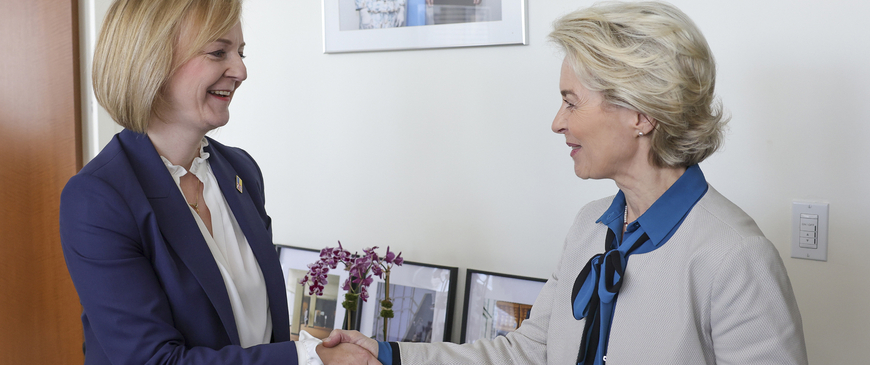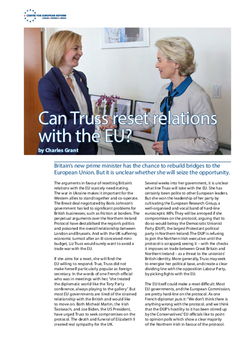
Can Truss reset relations with the EU?
Britain’s new prime minister has the chance to rebuild bridges to the European Union. But it is unclear whether she will seize the opportunity.
The arguments in favour of resetting Britain’s relations with the EU scarcely need stating. The war in Ukraine makes it important for the Western allies to stand together and co-operate. The Brexit deal negotiated by Boris Johnson’s government has led to significant problems for British businesses, such as friction at borders. The perpetual arguments over the Northern Ireland Protocol have destabilised the region’s politics and poisoned the overall relationship between London and Brussels. And with the UK suffering economic turmoil after an ill-conceived mini-budget, Liz Truss would surely want to avoid a trade war with the EU.
If she aims for a reset, she will find the EU willing to respond. True, Truss did not make herself particularly popular as foreign secretary. In the words of one French official who was in meetings with her, “she treated the diplomatic world like the Tory Party conference, always playing to the gallery”. But most EU governments are tired of the strained relationship with the British and would like to move on. Both Micheál Martin, the Irish Taoiseach, and Joe Biden, the US President, have urged Truss to seek compromises on the protocol. The death and funeral of Elizabeth II created real sympathy for the UK.
Several weeks into her government, it is unclear what line Truss will take with the EU. She has certainly been polite to other European leaders. But she won the leadership of her party by cultivating the European Research Group, a well-organised and vocal band of hard-line eurosceptic MPs. They will be annoyed if she compromises on the protocol, arguing that to do so would betray the Democratic Unionist Party (DUP), the largest Protestant political party in Northern Ireland. The DUP is refusing to join the Northern Irish executive until the protocol is scrapped, seeing it – with the checks it imposes on trade between Great Britain and Northern Ireland – as a threat to the unionists’ British identity. More generally, Truss may seek to energise her political base, and create a clear dividing line with the opposition Labour Party, by picking fights with the EU.
Several weeks into her government, it is unclear what line Truss will take with the EU. She has certainly been polite to other European leaders.
The EU itself could make a reset difficult. Most EU governments, and the European Commission, are pretty hard-line on the protocol. As one French diplomat puts it: “We don’t think there is anything wrong with the protocol, and we think that the DUP’s hostility to it has been stirred up by the Conservatives.” EU officials like to point to opinion polls which show a clear majority of the Northern Irish in favour of the protocol. The EU’s basic position is that it will not change the wording of the document that Johnson’s government negotiated.
One opportunity for Truss to start building bridges would be to attend the inaugural meeting of the European Political Community (EPC) in Prague on October 6th. Emmanuel Macron has dreamed up this new club, with the intention of bringing together the European democracies (in or outside the EU), to discuss common strategic challenges like Russia and energy security. Macron takes the EPC very seriously and has been urging Truss to show up and help to shape the way it develops. In the words of one French diplomat, “there is currently nothing good to say about relations between London and Paris – but if Truss goes to Prague, that would be one good thing.” However, many of Truss’s eurosceptic backers regard the EPC as little more than an attempt to force the British back into EU-dominated structures.
Flying to Prague would generate some goodwill, and give Truss the opportunity to get to know European leaders. But what really matters for a potential reset is the protocol. If Truss pushes ahead with the Northern Ireland Protocol Bill, which would allow the government to overturn parts of the protocol, no reset will be possible and bad relations with the EU would be guaranteed. If the bill enters into force – even without the government activating its clauses – the EU would respond to Britain’s disregard for international law by starting some sort of trade war.
Truss has one other weapon in her armoury for hitting the EU. This would be to invoke the protocol’s Article 16 – which allows either party to undertake unilateral safeguarding measures if the protocol leads to “serious economic, societal or environmental difficulties that are liable to persist, or diversion of trade”. The article requires both parties to search for a solution through negotiation. The EU would regard the use of Article 16 as a provocation, though less heinous than turning the Northern Ireland Protocol Bill into law. At various times Truss has threatened to invoke Article 16, but her current line seems to be to keep negotiating with the EU over the protocol, with hints that a deal must be reached before the 25th anniversary of the Good Friday Agreement next April.
The EU would regard the use of Article 16 as a provocation, though less heinous than turning the Northern Ireland Protocol Bill into law.
As Hilary Benn MP argued in a recent CER policy brief, a compromise on the protocol is feasible, if both sides show flexibility. The UK needs to set aside the Northern Ireland Protocol Bill, forget about Article 16 and bury its ideological obsession with removing the role of the European Court of Justice in policing the protocol. It should focus more on the practical difficulties that businesses encounter at the Irish Sea border – and a lot of the hassle would disappear if the UK aligned with EU standards on plant and animal health and food safety. In the past the UK spurned such an alignment on the grounds that it would stymie a trade deal with the US. But as Truss herself admitted recently, there is not going to be such a deal in the foreseeable future.
The EU needs to recognise that goods travelling from Great Britain to Northern Ireland that are destined to stay there are an insignificant threat to its single market. Checks on such goods should be minimal. As for the British worry that the protocol’s state aid provisions could subject companies in Great Britain to the Brussels regime, the EU could provide written assurances that this would not happen. While the EU is unwilling to change the protocol’s wording per se, some Commission officials would happily tag on an addendum, clarifying and interpreting the document in ways that would reassure the British.
If both sides can compromise on the protocol, a positive dynamic could emerge, with the British and the EU-27 treating each other as allies rather than rivals. The EPC could engender closer alignment on foreign and defence policy, leading to some sort of institutional co-operation between the UK and the EU. Both sides could treat the review of the Trade and Co-operation Agreement that is due in 2026 as an opportunity to smooth down some of its rougher edges – for example to allow Britons to travel briefly to the EU for work without needing a visa (with EU citizens gaining reciprocal rights).
Of course, anyone who has watched the Conservative Party for the past six years will be sceptical about the prospects of a reset. The party is now dominated by hard-line eurosceptics, whose belief in the Anglosphere blinds them to the potential benefits of good relations with the EU. Conservative pro-Europeans have been purged or keep very quiet about their beliefs. It is hard to imagine that a Conservative government would want more than the most modest and unambitious of resets. But if Truss displays some leadership, she can achieve such an outcome.
Charles Grant is director of the Centre for European Reform.

